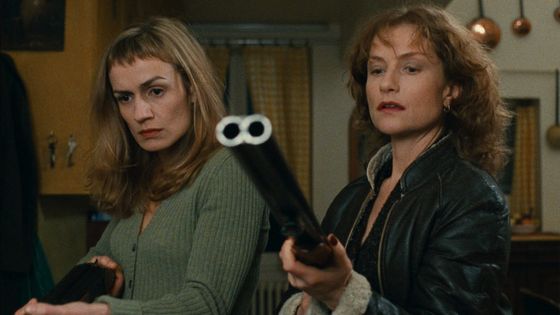Directed by Claude Chabrol
Written by Claude Chabrol and Caroline Eliacheff
Starring:
- Isabelle Huppert as Jeanne
- Sandrine Bonnaire as Sophie Bonhomme
- Jacqueline Bisset as Catherine Lelièvre
- Jean-Pierre Cassel as Georges Lelièvre
- Virginie Ledoyen as Melinda
- Valentin Merlet as Gilles
Rating: ![]()
In an Italian TV interview with Pier Paolo Pasolini in 1971, the inquisitive interviewer asks the controversial Italian director, “Who are the people you love the most? To which he eloquently replies, “The kind of people I love the most by far are the people who perhaps never even reached the fourth grade. Very plain and simple people, and these are not just empty words on my part. I say this because the culture of the petit bourgeoisie, at least in my nation but perhaps in France and Spain as well, always brings corruption and impurity along with it, while an illiterate, or those, who barely finished the first grade always have a certain grace, which is lost as they are exposed to culture. Then they find themselves once again at the highest level of culture. But conventional culture always corrupts.”
This particular moment of intellectual enlightenment by Pasolini turned into an inevitable evocation for me – an insightful epiphany – when watching Claude Chabrol’s iconoclastic masterpiece, La Cérémonie. Described by its author himself as “The last Marxist film”. Although that remark has more of a burlesque connotation than a political one, it is cogent enough to be regarded as a genuine observation. Even more credible considering that this picture is helmed by one of the most prolific and prestigious alumni of the French New Wave cinema, a groundbreaking film movement with a Marxist ideological core. La Cérémonie is one of the many paeans to leftist subversion that these French film critics and cineastes crafted during the French Nouvelle Vague and post-Nouvelle Vague. But Claude Chabrol’s 1995 film – adapted from Ruth Rendell’s 1977 novel A Judgment in Stone – is one of the most distinctive of its ilk. It is wrathful yet serene, it is radical yet passive, and it is unsettling yet uncommonly moving. The humanism embedded in every word enunciated by Pasolini in that 1971 interview unintentionally oriented me, guided me, and helped me to delve more compassionately into the formal coldness of Claude Chabrol’s filmmaking.
With simplicities and complexities – sometimes these seem interchangeable – Chabrol’s film subjectively introduces the protagonist of this story. Sophie Bonhomme (Sandrine Bonnaire) is a self-conscious but perceptive young woman who is hired by an affluent family to work as a maid in a lavish, secluded mansion in Brittany. Before being hired, Sophie meets with Catherine (Jacqueline Bisset) to be interviewed to determine if she is the ideal fit for the position. Catherine is a courteous and affable woman, yet her mannerisms seem more like pure convenience than genuine politeness. She is the mother of a teenage son and the stepmother of a young girl, daughter of her husband Georges (Jean-Pierre Cassel). Sophie’s first days on the job are simple routine; she ends up adjusting very well to the quiet surroundings of this bourgeois household. However, she is scrupulous and keeps her distance – this is a wealthy family with sophisticated tastes and privileged backgrounds, she is just a domestic servant – although Georges and Catherine’s attitude towards Sophie appears positive and they are enchanted by her work and her delectable cooking, the unseen wall that divides Sophie’s social status and the family is palpable, and thus, the perspectives are disturbingly ambiguous.
Under Sophie’s scrutiny, this family is perceived as judgmental, narrow-minded, antiquated and rude. Under the patronizing gaze of Georges and Catherine, Sophie is seen as a woman who victimizes herself and as a woman of dull, alienated and even hostile nature. Days go by, and Sophie’s life at work looks the same, there is no dramatic evolution to suggest otherwise. Chabrol is a Hitchcockian methodologist, which is why the deceptive composure of the framing and the proscenium staging never explicitly reveals danger, it suggests danger but does not confirm it with indiscretion. It is when we find out about Sophie’s illiteracy that the film initiates a certain dramatic conflict, although it does not fully explore it until its anarchic concluding act. The plot follows the guidelines of a ceremony; it has rules that gradually summon a violent apotheosis that is unleashed when the antagonistic, dual subjectivity becomes only one, that of Sophie. Even though Sophie’s unpredictability is essential to reach the Marxist climax, there is another character who proves to be just as relevant to Chabrol’s Hitchcockian procedures. This character is Jeanne (Isabelle Huppert), the postmistress, a loquacious, sassy and insouciant woman who befriends Sophie. Their amicable relationship is pure working-class camaraderie. And their encounters, their eye-opening conversations and their mischievous giggles, are more than an act of empathy, they are an act of rebellion. Isabelle Huppert devours the character – her verbal dexterity in divulging Jeanne’s playful anarchism is passionate, deadly and fierce – yet this is a film in which the performances are remarkable not for their individualism but for their collectivism. Huppert and Bonnaire are terrific together, they are dynamite – in the most insurgent sense of the word.
The profound effect that Claude Chabrol’s idiosyncratic formalism exudes is a masterstroke in radical moviemaking. Just by appreciating the structural diligence of the narrative in reciprocity with the metaphysics of the camera, one can detect a thrilling radicalism hidden in the faux passivity of the visuals and graceful cutting. The emotional contrasts are tricky to spot when you are so engrossed in the voluminous complexity of the events, yet if you look carefully at how the camera movements differ from the static shots, you will notice that from the beginning the apocryphal sense of imperturbability was in fact always one of hostility. The dry, gruesome finale is one of the great jibes at the absurdities of the bourgeoisie. Sophie is the most fascinating illiterate character cinema has ever put on screen, we do not justify her crime per se, we condone her rage. Which is more courageously intellectual and interestingly smart than any other educated ignoramus bragging about his socio-economic superiority.









